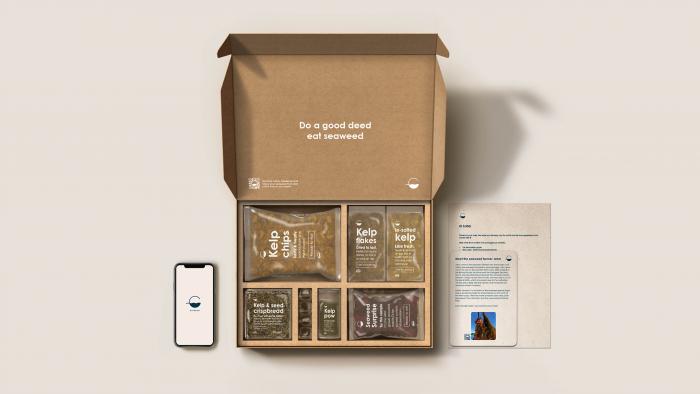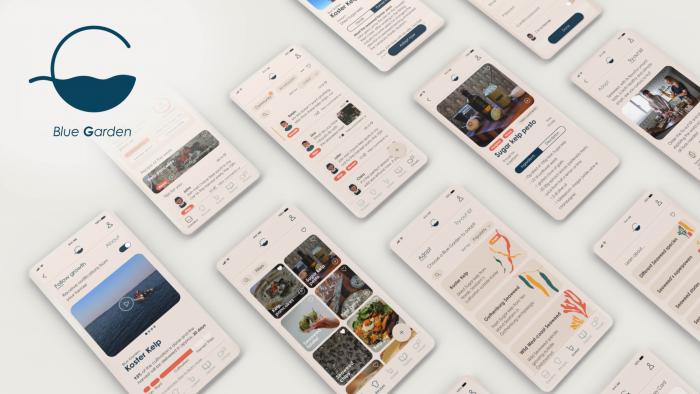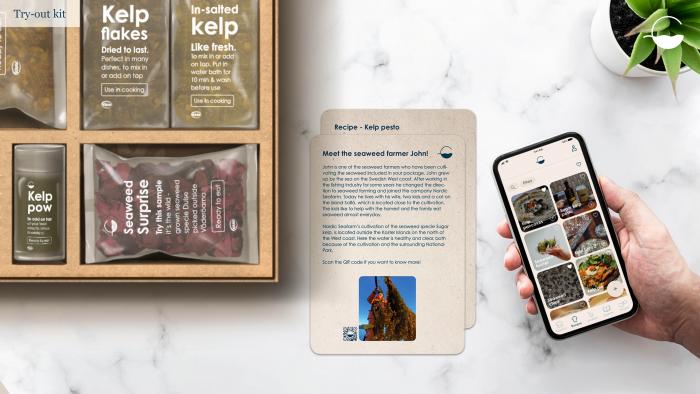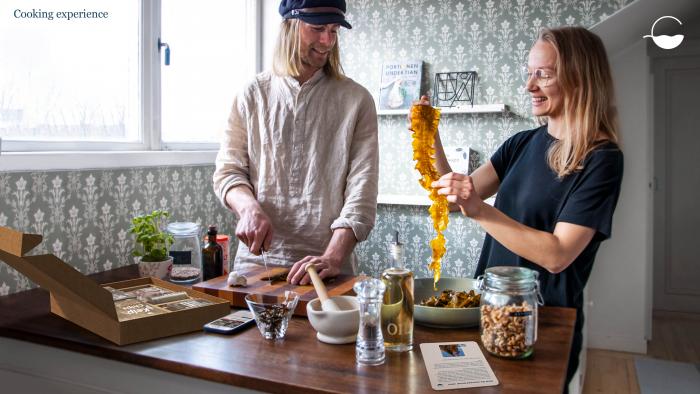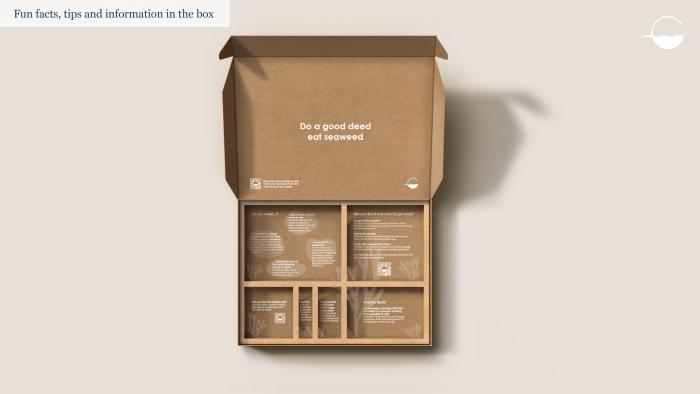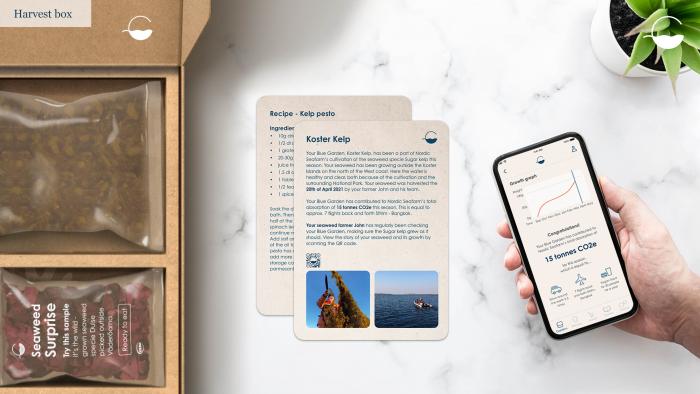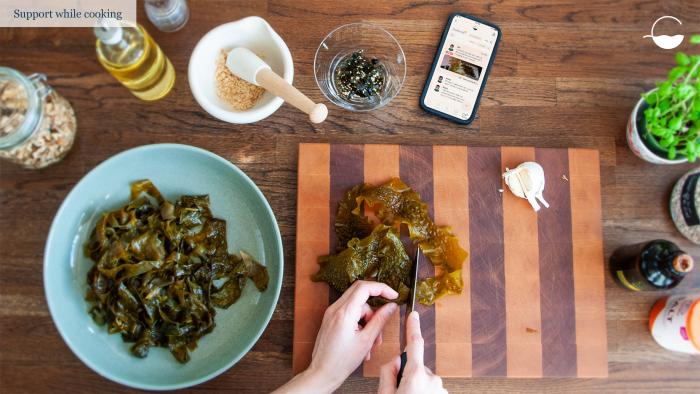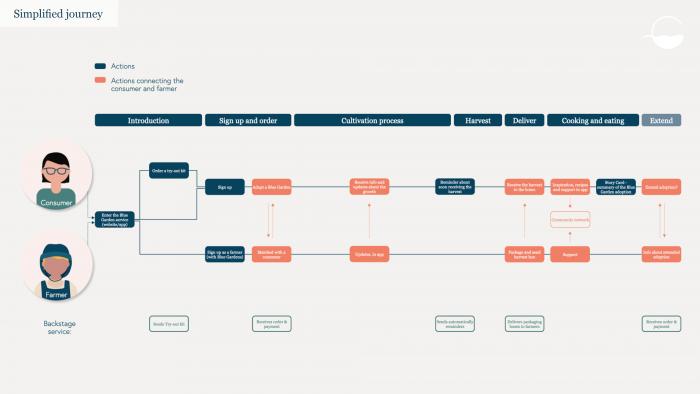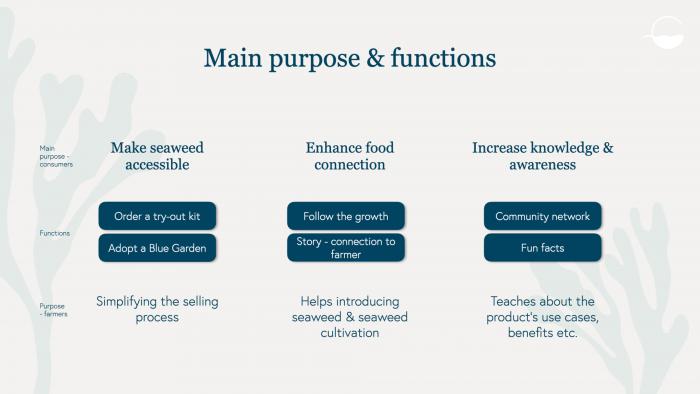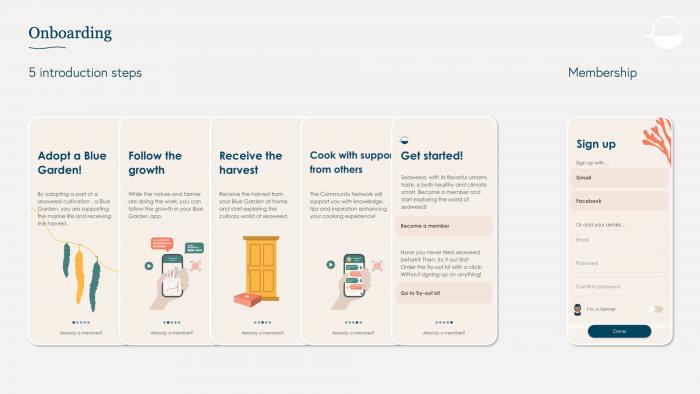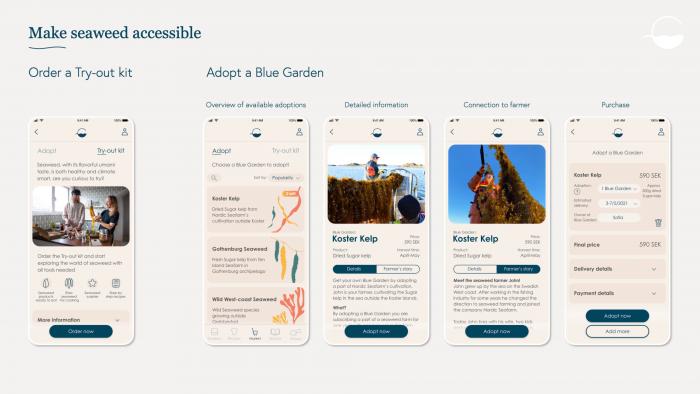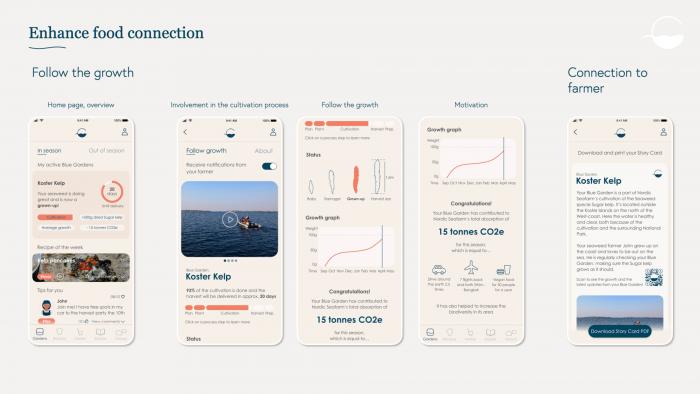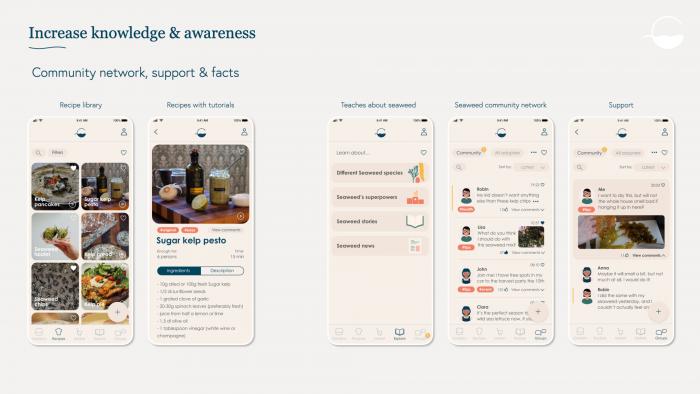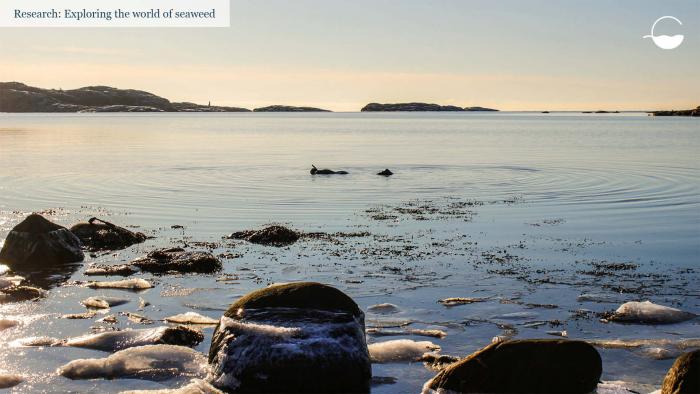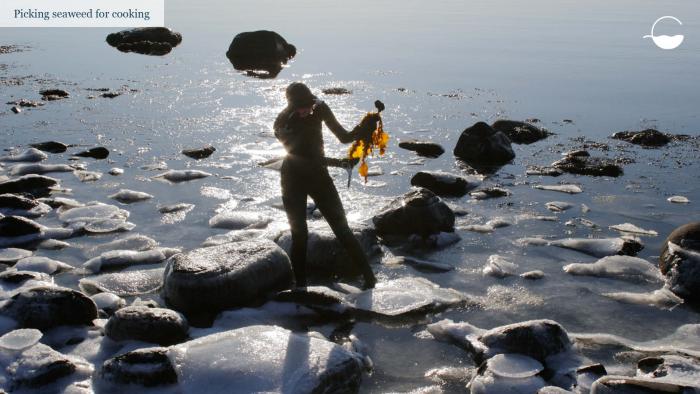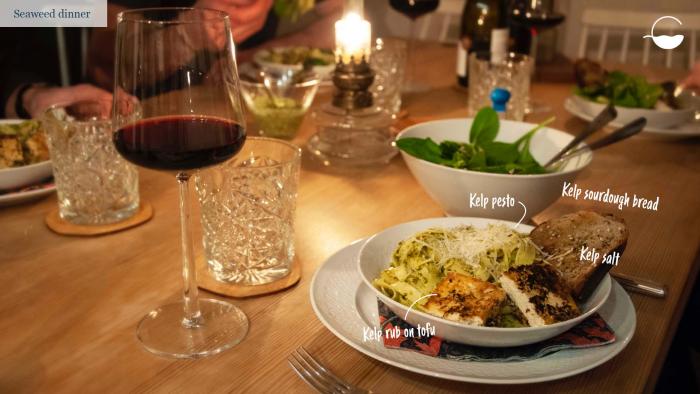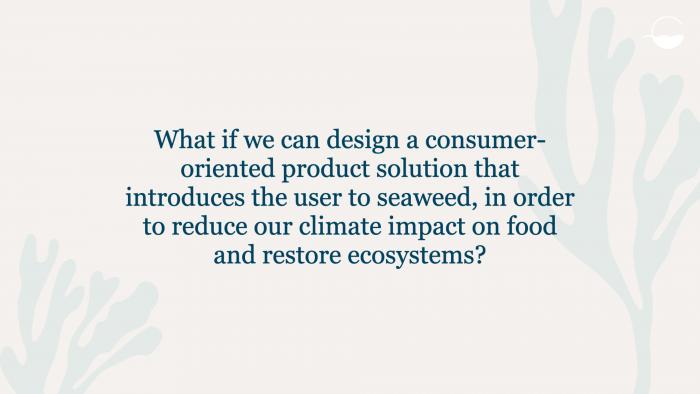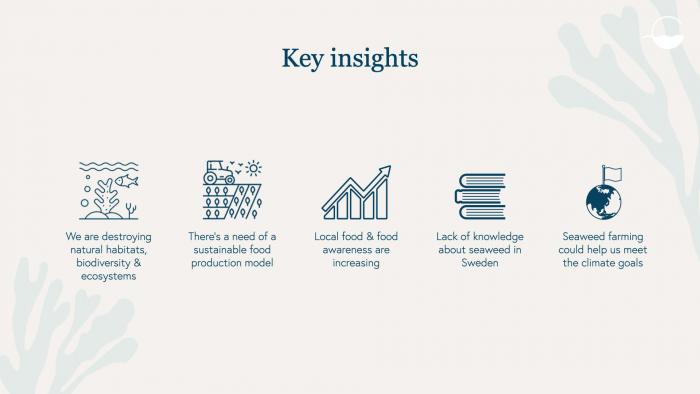I. SUMMARY INFORMATION
Project
269635
Status
Submitted
Award category
Products and life style
You want to submit
NEW EUROPEAN BAUHAUS RISING STARS : concepts or ideas submitted by young talents (aged 30 or less)
Project title
Blue Garden - introducing seaweed
Full concept/idea title
Blue Garden is a service introducing seaweed and connecting consumers to Swedish seaweed farmers
Description
Today’s food production is unsustainable, and one solution is seaweed farming. Obstacles are that, in Sweden, there’s a lack of knowledge about seaweed and we are not used to eating it. Blue Garden is a service, introducing seaweed in Sweden and connecting consumers to Swedish seaweed farmers. It consists of a mobile application, a Harvest box and a Try-out kit. Blue Garden enables easy access to seaweed, an improved food connection, increased knowledge and engagement through a community network
Where is your concept/idea being developed or intended to be implemented in the EU?
Sweden
Bohuslan
Kaprifolvagen 4
Stromstad
452 95
II. DESCRIPTION OF THE PROJECT
Please provide a summary of your concept/ idea
The way we are producing food today harms our lands and depletes our soils. With the increasing population, we will soon not have enough food to feed everybody. At the same time we are accelerating climate change and destroying natural habitats, biodiversity and important ecosystems. We have to make a change. There is a need for a sustainable, resilient and restorative food production model, creating carbon low food. A potential solution is Marine Permaculture, which is a type of seaweed farming. This solution can provide us with a sustainable and healthy food source, while at the same time leading to carbon sequestration and restoration of our harmed ocean. The next step is to introduce this food culture and food cultivation to Sweden.
The overarching aim of this project was to normalize the use of seaweed, mainly in food, while restoring our ocean by increasing the number of seaweed farms in Sweden. My research showed that there is a lack of knowledge about seaweed in Sweden, we are not used to eating it and it’s hard to find. There’s also an increasing desire to know where our food comes from and to eat locally produced food.
The result is the service Blue Garden. Blue Garden connects consumers, who want to try or buy seaweed, with Swedish seaweed farmers, enabling easy access to seaweed, an improved food connection and increased knowledge.
Blue Garden consists of a mobile application, a Harvest box and a Try-out kit. The service allows users to adopt a part of a seaweed cultivation, a Blue Garden, in order to receive its harvest. While the farmer and nature are doing the work, users can follow the growth and increase their knowledge in the app. The app also works as a platform for the Blue Garden seaweed community, where users can share recipes, inspire and learn from each other. After the harvest, the users receive the Harvest box at home. The Blue Garden Try-out kit is for the curious user, who wants to try seaweed before adopting a Blue Garden.
Please give information about the key objectives of your concept/idea in terms of sustainability and how these would be met
The project is tackling several of the UN Sustainable Development Goals and global problems, about food production, biodiversity and global warming. Seaweed is one out of a few resources that can contribute with a positive impact on both the environment, society and economy.
Environment: The overarching goal of the Blue Garden concept is to make more Swedes eat seaweed and increase its demand. Because that will increase the number of seaweed farms, which can provide us with a lot of climate-smart food, restore ecosystems, decrease ocean acidification and absorb carbon. This will be an important part for reaching our climate goals. If doing this in a smart way, using Blue Garden and an elaborative implementation plan, my hope is that it can inspire other countries to do the same and have a significant impact.
Society: If scalable, the Blue Garden concept could potentially decrease poverty in coastal areas where seaweed farming is possible. It could also help to support small-scale farmers and ensure sustainable and resilient food production systems that help maintain ecosystems. As well as providing us with healthy and locally produced food. Seaweed is one of the most nutritious foods on the planet and it can minimize the risks of national diseases, like heart disease.
Economy: Unlike farming on land, Marine permaculture doesn’t require any fertilizer, nutrition, or water. The ocean provides what’s needed. This makes it sustainable and almost self-driven, with a great economical benefit, as the expected price for fresh water and fertilizer will increase.
The Blue Garden concept can help with food security, contribute to responsible (food) production and make efficient use of this natural resource and food industry, with the potential for Sweden to be self-sufficient. It could also encourage industries to facilitate sustainable development, reduce food and post-harvest losses during production and create jobs that promote a lifestyle in harmony with nature.
Please give information about the key objectives of your concept/idea in terms of aesthetics and quality of experience beyond functionality and how these would be met
To reach my goal of normalizing the use of seaweed in Sweden, I had to introduce it in an engaging and attractive way, lowering the user’s thresholds. This is achieved by Blue Garden’s Try-out kit and adoption idea that includes a remote farming experience.
The Try-out kit works like a door opener to the world of seaweed! It’s designed to be easy and fun to use, consisting of a Story Card, recipes, tutorials and seaweed.
The recipes include inspiring pictures, step by step instructions and tutorials. Three physical recipes are included in the kit, and for the more engaged person there is also a recipe library and tutorials in the app, which can be reached by scanning a QR code on the box. The seaweed included in the kit are both products to test directly, and the raw form of seaweed to use in cooking. All seaweed products are packaged in an edible plastic, called Notpla, made out of seaweed.
The Story Card tells the story of the seaweed, about the farm and farmer, which is creating connection and awareness. Imagine being a dinner guest at a restaurant or in a friend’s home, being served this delicious seaweed dish, and having the possibility to read it’s story on the Story Card. By scanning the QR-code on the card there is also a possibility to get an overview of it’s growth and journey, from start to finished dish on your plate! My research showed that this transparency is an increasing desire for users to have, which is why I included it in the service.
The Blue Garden mobile application enables a ”remote farming experience” where the user can follow the growth of the seaweed. The user has the opportunity to see the current state in the cultivation process, the amount of carbon dioxide absorbed, the current size of the seaweed, its growth graph, as well as pictures and videos of it. The seaweed farmers are uploading this information to the app and making the consumers feel included in the process, which is enhancing their experience, knowledge and awareness.
Please give information about the key objectives of your concept/idea in terms of inclusion and how these would be been met
Blue Garden is an inclusive service from a social perspective. It’s designed to make seaweed accessible for anyone interested, regardless of location of living, level of income, culture or social status. Once a member in the service, the user gets access to the seaweed community network in the app. It’s a neutral space for inspiration and engagement, where users can contribute with insights, tips and tricks, and with seaweed recipes from different cultures. The community chat group invites inspiring discussions, users can ask questions and support each other. This creates a database of valuable information that we can utilize in the future. The community network enhances the level of inclusion, and creates a feeling of meaningfulness and belonging for the user. My research showed that we are more confident together with others, especially when exploring something new. This is why I included a supportive and inclusive platform in the service.
To introduce seaweed in Sweden we have to build awareness. People need to hear, see, and try seaweed. Restaurants, who are the biggest customer of seaweed today, are a crucial partner. By providing them the Blue Garden service they will have the possibility to show their guests the story behind the seaweed on their plate, using the Story Card. This makes the people consuming the seaweed, also feel inclusive and aware of what they are eating.
Another way of making it visible, is to involve citizens in a Blue Garden showcase cultivation, located for example in the city of Gothenburg, with a seafood restaurant connected to it. A place for citizen engagement, where people can meet, learn and try seaweed. This makes it easily accessible for everyone, as well as for tourism and for educational purposes.
These ideas are also a way of introducing people to the service. If they get curious and want to get their own seaweed, they have the possibility to sign up to the Blue Garden service, which is affordable for all Swedish families.
Please explain the innovative character of your concept/ idea
The conclusion of my project research was that we need to start eating seaweed, as it’s a healthy, sustainable, and resilient food source that we have a lot of in Sweden. Blue Garden creates the prerequisites that lower the threshold and make it happen! By making seaweed accessible as food and providing inspiration, engagement, knowledge, and support in one service. This is the innovative character of the concept.
What is missing in Sweden today is a place where to buy Swedish seaweed, which also inspires, educates, and supports with recipes, as well as supportive tools and motivation for people who want to start small-scale seaweed farming. This is why I designed Blue Garden.
The concept is supporting Swedish ocean farmers, who mostly are small-scale farmers. Blue Garden simplifies their selling process and helps them introduce seaweed and teach about its different use cases to their customers. Today the seaweed farmers are trying to do this themselves, which is hard and time-consuming. With Blue Garden they can concentrate on their actual job, to be farmers, as the service is taking care of the rest. This can motivate more people to start cultivating seaweed.
Even though the service is focusing on seaweed, the adopted Blue Gardens don’t need to only contain that. What if you can adopt a Blue Garden where different species are cultivated together - a marine permaculture garden. That would give the user the possibility to receive a harvest containing mussels, shellfish, seaweed, and sea cucumber from one adopted Blue Garden! This is something I wanted to include in the service already, but unfortunately, Sweden is not really receptive to this right now. Instead, I see it as a great development possibility.
Please detail the plans you have for the further development, promotion and/or implementation of your concept/idea, with a particular attention to the initiatives to be taken before May 2022
The Blue Garden service has received a lot of positive responses since it was presented on the 17th of May, this year. There are seaweed farmers on the Swedish west coast who want to help me take the project further and implement it. Today, most of their customers are chefs and restaurants, but they want to expand and reach out to ordinary consumers as well. They believe this will be easier using the Blue Garden service. Right now we are starting to work on an implementation plan and strategy as described below.
The first step would be to implement and test some of the Blue Garden functions on the seaweed farmers' current customers, the restaurants. The functions we are planning to start with are; the adoption concept, the remote farming experience where the users can follow the growth, and the Story Card. These functions would enhance the experience for the restaurants and their guests. In order to do this, a developer will code these parts of the Blue Garden app. The plan is to have this implemented by September this year and test it during the cultivation season, September to May. This first test round will be done in June 2022. After that, we will develop the tested functions further, based on the user’s feedback, and consider adding more functions to test in the second round.
The next step is to include ordinary consumers and other seaweed farmers in the service. This is a big step where basically the whole Blue Garden service is created and implemented. This step requires a backstage service that can take care of all the logistics, orders, payments, deliveries, etc. At this stage, it will also be important to implement the Try-out kit, in order to attract users and provide them the opportunity to test seaweed before adopting a Blue Garden.
Together with the seaweed farmers, the plan is to implement the first step and depending on the result, continue with the next step.
III. UPLOAD PICTURES
IV. VALIDATION
By ticking this box, you declare that all the information provided in this form is factually correct, that the proposed concept/idea has not been proposed for the New European Bauhaus Rising Stars Awards more than once in the same category.
Yes
